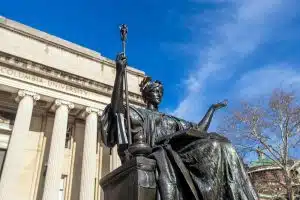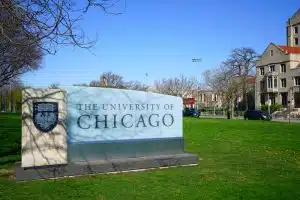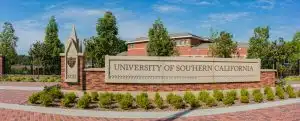Columbia University is a prestigious university that’s home to 35,872 students as of 2023. Around 59% or 21,458 of that population are admitted to Columbia graduate school. Every year, since 2014, Columbia’s graduate students have increased, and this is a testament to how sought-after their graduate programs are. With 16 graduate schools, Columbia is a pioneer in engineering, arts and sciences, and business.
In this blog, we list each Columbia graduate school and the specializations they offer. In addition, we discuss what it takes to get into these schools and what makes each of them stand out.
- Columbia University Graduate Schools
- How Does Columbia Graduate School Compare with Other Top Grad Schools?
- Frequently Asked Questions
- Takeaways
Columbia University Graduate Schools
Columbia University is a private graduate school located in the heart of Manhattan, New York City. It has a large and diverse graduate student community, with about 21,458 students enrolled. Columbia offers a wide range of graduate programs—132 in total—with 14 available online or through distance learning options. Around 19% of Columbia’s graduate students attend part-time, allowing for flexibility in balancing their studies with other commitments.
Here is a list of all 16 graduate schools in Columbia:
- Columbia Business School
- Columbia Journalism School
- Columbia Law School
- Columbia Mailman School of Public Health
- Columbia School of Social Work
- Columbia University College of Dental Medicine
- Columbia Graduate School of Architecture, Planning and Preservation
- Columbia University Graduate School of Arts and Sciences
- Columbia Graduate School of International and Public Affairs
- Columbia University School of Nursing
- Columbia University School of Professional Studies
- Columbia Graduate School of the Arts
- Columbia University Teachers College
- The Fu Foundation School of Engineering and Applied Science
- Vagelos College of Physicians & Surgeons
Here is a complete list of Columbia University’s graduate schools with the available degree programs and concentrations. Please note that we only included the top concentrations from each degree program.
| Columbia Graduate School | Degree Program (w/ top concentrations) |
| Columbia Business School | MBA |
| Executive MBA | |
| Master of Science:
MS in Accounting and Fundamental Analysis (MSAFA), MS in Financial Economics (MSFE), and MS in Marketing Science (MSM) |
|
| Doctor of Philosophy:
Accounting, Decision, Risk, & Operations (DRO), Finance, Management, and Marketing |
|
| Columbia Journalism School | Master of Science:
MS Investigative Specialization, MS Data Journalism, MS Documentary Specialization, MS Part-time Program |
| Master of Arts:
MA Arts & Culture, MA Business & Economics Concentration, MA Politics Concentration, MA Science Concentration |
|
| Doctor of Philosophy:
PhD in Communications |
|
| Columbia Law School | Master of Laws (LL.M.) |
| Executive Master of Laws (Executive LL.M.):
Global Business Law |
|
| Doctor of Science of Law (J.S.D.) | |
| Columbia Mailman School of Public Health | Master of Public Health |
| Master of Science:
Biostatistics (Clinical Research Methods, Pharmaceutical Statistics, Statistical Genetics,Theory and Methods, Patient Oriented Research, Public Health, Data Science), Environmental Health Sciences (Toxicology, Environmental Health Data Science), Epidemiology, Population & Family Health, Sociomedical Sciences |
|
| Master of Health Administration | |
| Doctoral Programs:
Doctor of Philosophy (PhD) – Biostatistics, Environmental Health Sciences, Epidemiology, Population and Family Health Doctor of Public Health (DrPH) – Biostatistics, Environmental Health Sciences, Epidemiology, Sociomedical Sciences |
|
| Columbia Graduate School of Social Work | Master of Science in Social Work (with online option) |
| Doctor of Philosophy:
Advanced Practice, Social Policy and Policy Analysis, Social Policy and Administration |
|
| Columbia University College of Dental Medicine | Residency:
Advanced Education in General Dentistry Certificate (AEGD) Program, General Practice Residency, Oral and Maxillofacial Pathology Residency, Oral and Maxillofacial Surgery/MD Residency, Pediatric Dentistry Residency |
| University Postdoctoral:
Advanced Education in General Dentistry Certificate (AEGD) Program, Endodontics Program, Orthodontics Program, Periodontics Program, Prosthodontics Program |
|
| Columbia Graduate School of Architecture, Planning and Preservation | Architecture:
Master of Architecture, Master of Science in Advanced Architectural Design, Master of Science in Computational Design Practices, Masters of Science in Critical, Curatorial, and Conceptual Practices PhD in Architecture |
| Urbanism:
Master of Science in Architecture and Urban Planning, Master of Science in Urban Planning Ph.D. in Urban Planning |
|
| Preservation:
Master of Science in Historic Preservation PhD in Historic Preservation |
|
| Real Estate
Master of Science in Real Estate Development |
|
| Columbia Graduate School of Arts and Sciences | Master of Arts
African-American Studies; American Studies; Anthropology; Art History and Archaeology; Biotechnology; Classical Studies; Classics; East Asian Languages and Cultures; East Asian Regional Studies; Ecology, Evolution, and Conservation Biology; Economics; English and Comparative Literature; European History, Politics and Society |
| Doctor of Philosophy
Anthropology; Architecture; Art History and Archaeology; Astronomy; Biological Sciences; Chemical Physics; Chemistry; Classical Studies; Classics; Earth and Environmental Sciences; East Asian Languages and Cultures |
|
| Columbia University School of International and Public Affairs | Masters:
Master of International Affairs, Master of Public Administration, MPA in Development Practice, MPA in Economic Policy Management |
| Doctor of Philosophy:
PhD In Sustainable Development |
|
| Columbia University School of Nursing | Practitioners:
Adult-Gerontology Acute Care Nurse Practitioner, Family Nurse Practitioner, Psychiatric Mental Health Nurse Practitioner |
| Masters:
Masters Direct Entry Program (for non nurses) Masters in Advanced Clinical Management and Leadership |
|
| Doctoral
Midwifery, Doctor of Nursing Practice, Doctor of Philosophy, Doctor of Nursing Practice (DNP) in Nurse Anesthesia Program |
|
| Columbia University School of Professional Studies | Masters:
Master’s Degrees in Actuarial Science, Master’s Degrees in Applied Analytics, Master’s Degrees in Bioethics, Master’s Degrees in Construction Administration, Master’s Degrees in Enterprise Risk Management, Master’s Degrees in Human Capital Management |
| Master of Professional Studies | |
| Columbia University School of the Arts | Master of Fine Arts:
Film, Theatre, Visual Arts, Writing |
| Master of Arts:
Film and Media Studies |
|
| Columbia University Teachers College | Master of Arts:
Anthropology and Education; Communication, Media and Learning Technologies Design; International and Comparative Education |
| Master of Education:
Cognitive Science in Education, Early Childhood Education, English Education |
|
| Doctor of Education:
Communication Sciences and Disorders; Mathematics Education; Teaching of Social Studies |
|
| Doctor of Philosophy:
Counseling Psychology, Cognitive Science in Education, Applied Behavior Analysis |
|
| The Fu Foundation School of Engineering and Applied Science | Master of Science:
Master of Science in Applied Physics and Applied Mathematics, Master of Science in Biomedical Engineering, Master of Science in Chemical Engineering, Master of Science in Civil Engineering and Engineer Mechanics, Master of Science in Computer Engineering |
| Doctor of Philosophy | |
| Doctor of Engineering Science | |
| Vagelos College of Physicians & Surgeons | MD Program |
| Programs in Genetic Counseling:
MS in Genetic Counseling |
|
| Programs in Human Nutrition:
PhD in Nutrition and Metabolic Biology, MS in Human Nutrition |
|
| Programs in Occupational Therapy:
Doctor of Education in Occupational Therapy, Master of Science in Occupational Therapy |
|
| Programs in Physical Therapy:
Doctor of Physical Therapy, Doctor of Education in Movement Science |
|
| PhDs in Biomedical Sciences
Biochemistry, Molecular Biophysics and Structural Biology; Biomedical Informatics; Cancer Biology; Cellular and Molecular Physiology & Biophysics; Genetics and Development |
Here is a closer look at some of the more popular Columbia graduate schools:
The Fu Foundation School of Engineering and Applied Science
Graduate programs at The Fu Foundation School of Engineering and Applied Science are flexible, and designed to fit your needs and interests. There are no strict course requirements, and your program is customized to help you reach your academic and career goals.
To apply, you’ll need an undergraduate degree and an official transcript. Most applicants continue in the same field as their undergrad, but if you’re switching fields, you may need to take some basic courses first.
You can transfer up to 15 credits of graduate-level work from Columbia, as long as they weren’t used for another degree. To graduate, you must complete at least 30 credits at Columbia, with 15 credits taken while enrolled in the said Columbia graduate school. If you plan to switch between a Ph.D. and Eng.Sc.D., be sure to check both schools’ specific requirements.
Columbia Business School
At Columbia Business School, the curriculum is always evolving to keep up with the latest trends. You’ll find pioneering courses, STEM certification options, and hands-on learning experiences that put you at an advantage in the world of modern business.
The program blends essential management skills with data science and the latest business insights. It provides you with a deep understanding of areas like digital transformation, entrepreneurship, innovation, 21st-century finance, the role of business in society, and climate sustainability.
Columbia Graduate School of Arts and Sciences
As one of the oldest and most respected graduate schools in the country, the Columbia Graduate School of Arts and Sciences (GSAS) offers graduate degrees in the humanities, natural sciences, and social sciences. You’ll work alongside world-class faculty who help students deepen their knowledge and prepare for various career paths.
Around 3,400 students are part of GSAS, conducting research and studying with over 800 faculty members right in the heart of New York City. The school offers both master’s and doctoral programs within Columbia’s Faculty of Arts and Sciences, along with interdisciplinary and global programs that connect GSAS with other schools at Columbia and beyond.
Columbia Graduate School of Journalism
At Columbia Journalism School, you’ll get the chance to take small, hands-on classes across all storytelling mediums, taught by distinguished journalists. At Columbia University, many faculty members are recognized leaders in their fields, including Pulitzer Prize winners and MacArthur “Genius” Fellows. For example, Saidiya Hartman, a professor of English and Comparative Literature, is a MacArthur Fellow known for her work in African American literature and history. Many of your instructors are award-winning professionals, including Pulitzer Prize winners, MacArthur “Genius” Fellows, and recipients of the Peabody, Emmy, National Magazine, Guggenheim, and National Book Critics Circle Awards.
Other distinguished professors include those who have won prestigious awards like the Peabody, Emmy, National Magazine, Guggenheim, and National Book Critics Circle awards. For example, June Cross, a professor at Columbia, has won a Peabody Award, a National Emmy, and the DuPont-Columbia Journalism Award for her work highlighting issues of race, politics, and public health. Another faculty member, Jonathan Weiner, is a Pulitzer Prize winner for his book The Beak of the Finch, and has also won the National Book Critics Circle Award for his non-fiction work Time, Love, Memory. These instructors, among others, bring a wealth of experience and recognition to their teaching at Columbia
Columbia Journalism School is home to the Pulitzer Prizes, which are awarded annually for achievements in journalism, literature, and musical composition. The prize was established by Joseph Pulitzer and remains one of the most prestigious awards in the field of journalism.
How Does Columbia Graduate School Compare with Other Top Grad Schools?
Columbia University’s graduate schools consistently rank among the best in the world, alongside schools like Harvard, Stanford, and MIT. Columbia Business School is ranked #8 globally by U.S. News & World Report for 2024, with strong placements in finance and consulting and an average MBA starting salary of $175,000. The Graduate School of Arts and Sciences (GSAS) is also highly respected, with humanities programs like English and history often ranking in the top five, similar to Harvard and Yale.
Columbia Law School is another standout, ranked #8 in 2024. It is known for its strengths in corporate and international law. Graduates often land top clerkships and positions at major law firms.
Moreover, the Mailman School of Public Health consistently ranks in the top 10. It focuses on public health policy and global health. At the same time, the School of International and Public Affairs (SIPA) is well-known for its programs in diplomacy, public policy, and international relations.
What sets Columbia Graduate School apart is its location in New York City. It is unmatched in terms of access to major corporations, global organizations, media, and government. While schools like Stanford focus more on tech, Columbia’s top-ranked programs and networking opportunities in NYC make it one of the most versatile and competitive graduate schools.
Frequently Asked Questions
1. What is Columbia grad school’s acceptance rate?
The Columbia grad school acceptance rate varies by program, but they are generally competitive. For many programs, the acceptance rate ranges from around 10% to 20%, though some highly selective programs, like in law, business, or arts and sciences, can have acceptance rates below 10%. The Columbia masters acceptance rate depends on the department and field of study.
2. What is Columbia’s PhD acceptance rate?
Columbia University doesn’t share an overall PhD acceptance rate, as it varies by department and field. However, Ph.D. programs are very competitive, with acceptance rates usually between 5% and 10%. In highly competitive areas like the humanities or social sciences, rates can be even lower. The selectivity comes from Columbia’s strong reputation, top faculty, and limited program spots.
3. How hard is it to get into Columbia University?
Getting into Columbia University is very challenging due to its low acceptance rate and high academic standards. The acceptance rate for undergraduate programs is around 4%. It is one of the most selective universities in the U.S. Admission to graduate programs is also highly competitive, with selectivity varying by department. Strong academic records, impressive extracurriculars, and high test scores are essential for a successful application.
4. How to get into Columbia University?
To get into Columbia University, you’ll need a mix of strong academics, meaningful extracurriculars, and a standout application. Keep your GPA high, especially in challenging courses like AP or IB, to show you’re academically prepared. While Columbia is test-optional, good SAT/ACT scores can still boost your undergrad application. Aim for a GPA close to or above 3.9 since that is the general average at Columbia. Your SAT score should be around 1560.
For graduate programs, strong GRE, GMAT, or LSAT scores might be required, depending on the field.
To boost your chances, get involved in extracurriculars that highlight leadership and passion. Your application essays are a game changer—it should show who you are, your goals, and how you’d contribute to the Columbia community. Strong recommendation letters from teachers or mentors who know you well are also important.
For Columbia graduate school programs, be sure to show how your research aligns with Columbia’s faculty. A focused, genuine application will give you the best shot at getting in.
Takeaways
Like its undergraduate education, a Columbia graduate school education is prestigious and world-class. In 2023, around 21,458 students were enrolled in its 16 graduate schools, more than half of Columbia’s student population.
- Columbia Journalism School is home to the Pulitzer Prizes, which are awarded annually for achievements in journalism, literature, and musical composition.
- Columbia graduates are as competitive as their contemporaries from Harvard, Stanford, and Yale.
- Columbia Business School is ranked #8 globally by U.S. News & World Report for 2024, with strong placements in finance and consulting and an average MBA starting salary of $175,000.
- If your long-term academic plans include being admitted to a Columbia graduate school, it is advisable to start your preparation during your undergraduate studies. Consult a college admissions expert to help you prepare for your academic journey.








































